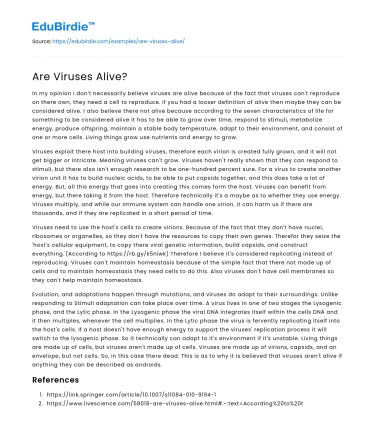In my opinion I don’t necessarily believe viruses are alive because of the fact that viruses can't reproduce on there own, they need a cell to reproduce. If you had a looser definition of alive then maybe they can be considered alive. I also beileve there not alive because according to the seven characteristics of life for something to be considered alive it has to be able to grow over time, respond to stimuli, metabolize energy, produce offspring, maintain a stable body temperature, adapt to their environment, and consist of one or more cells. Living things grow use nutrients and energy to grow.
Viruses exploit there host into building viruses, therefore each virion is created fully grown, and it will not get bigger or intricate. Meaning viruses can't grow. Viruses haven't really shown that they can respond to stimuli, but there also isn't enough research to be one-hundred percent sure. For a virus to create another virion unit it has to build nucleic acids, to be able to put capsids together, and this does take a lot of energy. But, all this energy that goes into creating this comes form the host. Viruses can benefit from energy, but there taking it from the host. Therefore technically it's a maybe as to whether they use energy. Viruses multiply, and while our immune system can handle one virion, it can harm us if there are thousands, and if they are replicated in a short period of time.
Save your time!
We can take care of your essay
- Proper editing and formatting
- Free revision, title page, and bibliography
- Flexible prices and money-back guarantee
Viruses need to use the host's cells to create virions. Because of the fact that they don't have nuclei, ribosomes or organelles, so they don't have the resources to copy their own genes. Therefor they seize the 'host's cellular equipment, to copy there viral genetic information, build capsids, and construct everything.'(According to https://rb.gy/k5niwk) Therefore I believe it's considered replicating instead of reproducing. Viruses can't maintain homeostasis because of the simple fact that there not made up of cells and to maintain homeostasis they need cells to do this. Also viruses don't have cell membranes so they can't help maintain homeostasis.
Evolution, and adaptations happen through mutations, and viruses do adapt to their surroundings. Unlike responding to Stimuli adaptation can take place over time. A virus lives in one of two stages the Lysogenic phase, and the Lytic phase. In the Lysogenic phase the viral DNA integrates itself within the cells DNA and it then multiples, whenever the cell multiplies. In the Lytic phase the virus is fervently replicating itself into the host's cells. If a host doesn't have enough energy to support the viruses' replication process it will switch to the lysogenic phase. So it technically can adapt to it's environment if it's unstable. Living things are made up of cells, but viruses aren't made up of cells. Viruses are made up of virions, capsids, and an envelope, but not cells. So, in this case there dead. This is as to why it is believed that viruses aren't alive if anything they can be described as androids.
References
- https://link.springer.com/article/10.1007/s11084-010-9194-1
- https://www.livescience.com/58018-are-viruses-alive.html#:~:text=According%20to%20the%20seven%20characteristics,and%20adapt%20to%20their%20environment.
- https://www.khanacademy.org/test-prep/mcat/cells/viruses/a/are-viruses-dead-or-alive






 Stuck on your essay?
Stuck on your essay?

